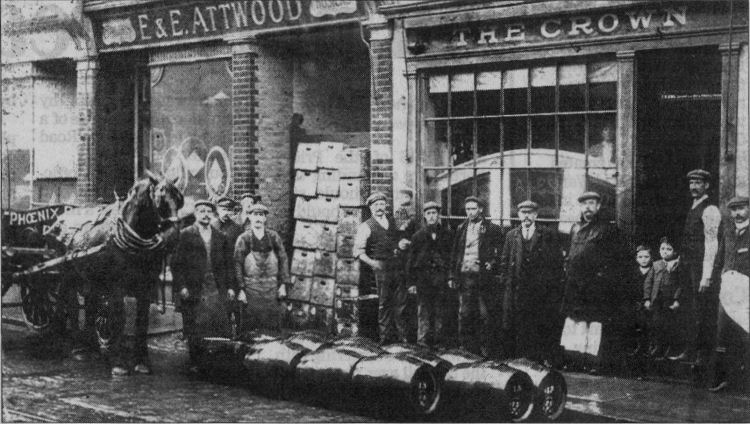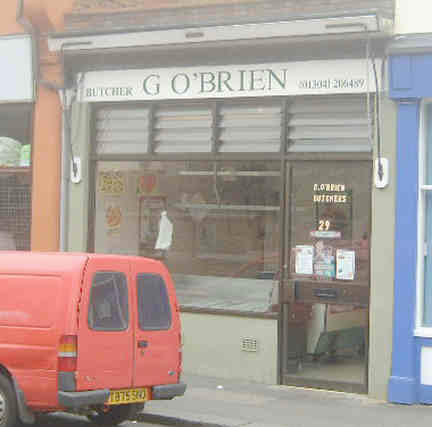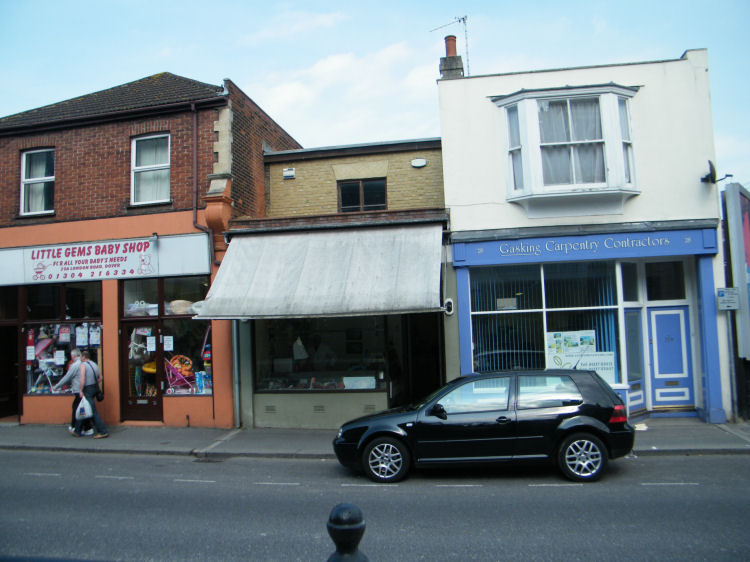|
From the Dover Express and East Kent News, Friday, 4 March, 1914. Price 1d.
REMOVAL OF PUBLIC HOUSE AT BUCKLAND
On Monday the decision of the Licensing Committee, who sat in February
last, came up for the approval of the Magistrates, Mr. J. L. Bradley (in
the chair), Capt. R. B. cay, R.N., Dr. C. Wood, and Messrs. F. W.
Prescott, W. Bradley, F. Wright, M. Pepper, H. F. Edewin, J. W. Bussey,
G. C. Rubin, J. D. Atkins, W. J. Palmer, H. Hobday, W. J. Barnes, J.
Scott, A. Clark, and T. A. Terson.
BUCKLAND REMOVAL REFUSED
Mr. R. Mowll applied on behalf of Messrs. Leney and Co., for the
confirmation of the removal of the existing licence of the “Crown Inn,”
London Road, to premises at the corner of Whitfield and Buckland Avenue.
He said that the removal was unanimously agreed to by the Licensing
Committee, who were fully represented at the time with the exception,
they regretted, of the present Chairman, whose ill health, he supposed,
did not permit him attending.
Mr. Bradley: I should not have been of any avail if I had.
Mr. Mowll, after explaining the application, said that the practice of
the Court – although of course it did not bind the Magistrates that day
– had invariably been for many years past for the confirming authority
to accept the decision of the Licensing Committee. The Magistrates of
course had a perfect right to question, and could also over-rule, the
decision of the Licensing Committee, who they themselves appointed. At
the previous application Mr. E. E. Chitty, representing the Dover
Temperance Council, the Rev. W. W. Goldstraw, and Mr. Vallintine,
explained the case at considerable length, and was present again today
to oppose the confirmation. Mr. Mowll pointed out that the proposal was
not to increase the number of licensed houses in the town, but simply to
remove an existing beer on and off licence from one site to another. The
site was in the new neighbourhood where there were no other licensed
houses for a considerable distance, and he asked that the Licensing
Committee's decision should be confirmed upon the grounds that the
people in the neighbourhood should be afforded reasonable facilities. He
knew that some Magistrates held very conscientiously the views that
licensed houses were not desirable, but of course that must not prevail
with the Bench. That was not the true test to be applied. The true test
was as to whether the neighbourhood was adequately furnished with
licensed premises. There was evidence before the Licensing Committee
that 260 houses were already built and another 80 were about to be
constructed, which made a total of 340. the usual method of calculating
a population in the area was five people to a house, so that would give
them a population of something like 1,700. The majority report of the
Royal Commission on Licensing recommended a licence for every 400
people, so it would seem that this was a very strong case. There was not
a single resident in the district who was sufficiently hostile to the
application either to come forward as a witness or to undertake the cost
of opposing. The opposition entirely proceeded from his old friends the
teetotallers, and he was bound to say that in these matters sometimes
the object of these people seemed to be rather to prevent than to
furnish the reasonable facilities to which the public were entitled. His
friend Mr. Chitty, very ingeniously tried to get over the difficulty of
there not being anyone in the district sufficiently hostile ton oppose
by giving evidence, by getting up a petition. He calculated that of 260
houses, 145 had been visited, and 88 householders and 15 wives signed so
that the petition did not carry much weight. In the course of his
argument Mr. Chitty was driven to some desperate reasons for asking the
Licensing Committee to refuse the application; one reason being that Mr.
Buss had been refused. It was very good of Mr. Chitty to take Mr. Buss
under his wing, but Mr. Buss's application was on an entirely different
ground inasmuch as it was applying for a new licence. His friend next
resorted to the most ingenious argument he had ever heard on behalf of
the temperance advocates. Mr. Chitty took under his protection the
customers of the “Crown.” His soul was filled with indignation that the
people who now use the “Crown” should not have the opportunity of
continuing to frequent that house. Then again Mr. Chitty said that they
ought to have applied for a new licence. The net result of that, if they
succeeded, would be that they would not only have the “Crown” licence,
but the new licence as well, thus increasing the number of licences in
the town. His friend also said something about monopoly value. Monopoly
value it was true was probably not payable under the removal, but then
on the other hand they got no compensation for the closing of the
“Crown,” so that it was as broad as it was long. He asked the Bench to
follow the course adopted by their predecessors and confirm the removal.
Mr. E. E. Chitty said that he appeared to oppose on behalf of the Rev.
W. W. Goldstraw, Mr. W. T. Vallintine, and members of the Dover
temperance Council. Mr. Mowll had told them quite correctly that it had
been almost the custom for licences granted by the Licensing Committee
to be confirmed by the confirming authority, but it did not follow that
everything customary in Dover in the past had been beneficial. He
thought that this particular kind of application was very different from
many that had come before the Bench. He suggested that there was a
strong and serious objection to the application, both on the merits of
the application itself and on the general principles. In reply to the
argument that not a single person had appeared to oppose from the
neighbourhood, he pointed out that not a single person had asked for the
removal of the licence. The only people present who wished for it were
the brewers, who already owned two of the nearest licences, one within
200 yards. A very large number of people had shown themselves opposed to
it. He could quite agree with the information of his friend as regards
the petition. The number of houses visited was 145 and eliminated the
wives there were 121 people seen, of whom 91 actually signed the
petition.
Mr. Mowll: The difference is only between 91 and 88.
Mr. Chitty said that three to one of those seen signed the petition.
Mr. Mowll: Not three to one of those in the area.
Mr. Chitty: Three to one in the area visited. Continuing, he said that
in the matter of principle there was a very strong objection. If the
Bench adopted the practice of granting new licences by way of removals
they would encourage the brewers to continue in existing houses, which
ought to die a natural death, in the hope that they would be able to
exchange the licence for a new licence some day without paying monopoly
value for it. It was obvious that the house which did not pay was the
most dangerous. The house where a man could get a living honestly was
the house to be shut up. He did not say that this house was such a
house. The Bench were asked to consider the wishes of the neighbourhood.
That was the primary point. Mr. Mowll had said that it was the same
thing whether they had a monopoly value or the house was compensated
under the Act, but he forgot that the monopoly value was paid to the
public, and that the taxpayer got the benefit.
Mr. Mowll: Not the ratepayer. It is paid to the Exchequer.
Mr. Chitty said that the Exchequer got the money, but the compensation
was paid to the brewers. Another point was that if a new licence was
granted the Bench would have a right to attach conditions, but by
removing a licence they would be deprived of that right. The whole
principle of granting a removal was wrong and encouraged the worst kind
of house to remain, and deprived the public of its monopoly value and
the Bench of its salutary description to impose conditions. He asked
that the Bench should accede to the wishes of the majority of the people
in the neighbourhood who asked that the removal be refused.
The Magistrates adjourned to consider the case, and on returning, the
Chairman said that the application was refused.
|
|
From the Dover Express and East Kent News, Friday, 20 January, 1905. Price 1d.
THE CROWN INN
Mr. Rutley Mowll applied on behalf of Mr. King, for permission to draw
at the “Crown Inn.” An application was made to the Magistrates the other
day, and the circumstances were not quite explained to them in respect
to this house. Mr. Arter, the outgoing tenant, had been in the house
about seven months, which was less than the prescribed period, a rule
having been made that nine months should expire between transfers. That
rule as they knew, was liable to be dispensed with on special occasions,
and he asked them to grant the permission, notwithstanding nine months
had not expired. In fact, he would not have been there, but for an
unfortunate oversight, which occurred in this way. Perhaps they knew
each Bench had its own time for this rule, in some cases twelve months,
in others nine or six months. Six months having expired, by some
confusion the application was put forward after six months but within
the nine months. The change had really taken place, and he was in a
rather awkward fix, the house being shut up, and he asked them to
relieve him from that difficulty and to grant Mr. King, whom he could
prove was a respectable man, permission to draw at the house. He
produced testimonials from Mr. Councillor Austin and from Alderman
Adcock as to Mr. King's respectability.
Mr. Pepper: Why does Mr. Arter want to give it up?
Mr. Mowll: He hasn't been sufficiently successful.
Mr. Pepper: He sold good sausages there if not beer.
Mr. Mowll: Very good beer and sausages as well. They went together.
(Laughter).
The Magistrates granted the application.
|


